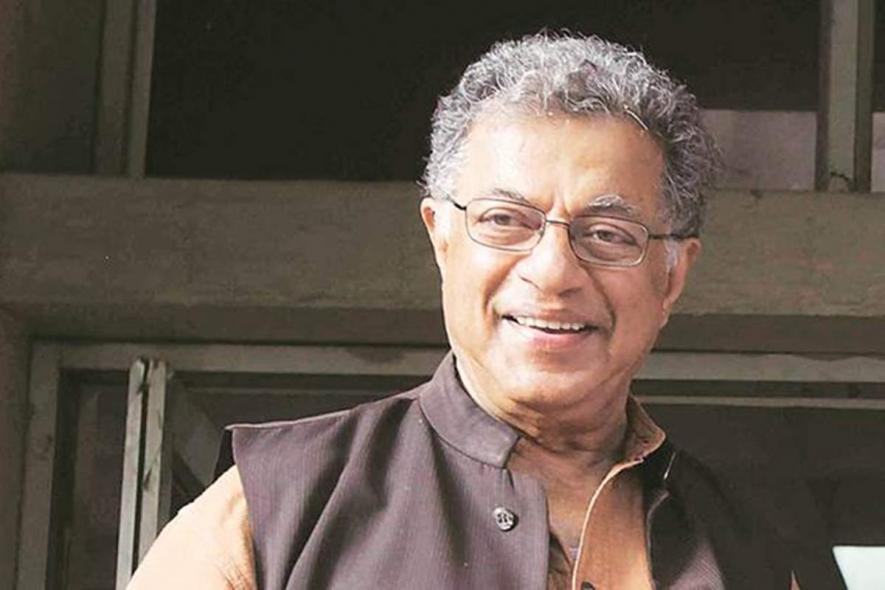Girish Karnad: A Man who Packed the Work of Many Lives into One

Girish Karnad
"To describe Girish Karnad as a major Indian playwright, or a versatile actor, or an influential intellectual, is simply not enough. There are other stories we need to pay attention to if we want to describe, and pay tribute to, a man who packed the work of many lives into one life."
— Githa Hariharan, Writer
On this day last year Girish Karnad passed away after a prolonged illness at the age of 81. At one of the last public appearances he made before his death, he had a placard around his neck that said "I am an Urban Naxal". This was at an event to mark the death of Gauri Lankesh who was shot dead by assailants outside her home in 2017. Gauri's name was part of a hit list that had names of 33 other people. Girish Karnad’s name topped the list.
This was the kind of person Karnad was. Fearless. Resilient.
Karnad dedicated himself to defending progressive values and his formidable contribution to theatre, cinema and literature are testimonies to this will.
We are sharing the Foreword to Guillermo Rodríguez's When Mirrors Are Windows: A View of A.K. Ramanujan’s Poetics, written by Girish Karnad, in his memory.
In When Mirrors Are Windows, Guillermo Rodríguez analyses the works of A.K. Ramanujan (1929–1993) — one of India's finest poets, translators, essayists, and scholars of the twentieth century — to illuminate the influence of classical Tamil, medieval bhakti, and oral folk aesthetics and literature on his work.
There is no other figure like A.K. Ramanujan on the intellectual landscape of India.
He was a teacher who loved teaching. I was fortunate enough to have met him when I was only 16. I was a student of mathematics in Dharwad and he was a junior lecturer in English, teaching at a college some 50 miles away. That distance seemed immense in those days and we did not meet too often, but whenever we did, whether on a railway platform, in the college canteen, or on the long walks he loved, he would hold forth, turning the meeting spontaneously into a class on whatever topic excited him or me at the moment. His enthusiasm for teaching continued to pour forth in the many workshops, seminars, and symposia he conducted throughout his life.
Later, he moved to the USA and taught in Chicago, and I watched in awe as he extended his range of interests to cover subjects as diverse as linguistics, anthropology, folklore, history of religions, literary studies, and ethnography. In spite of his involvement in such a wide range of disciplines, however, there is little doubt that Ramanujan will ultimately be remembered for having brought to light with his translations three distinct bodies of ancient literature, the very existence of which was unknown to the world outside until then—the ancient Tamil Sangam anthologies, the later bhakti poems of the Alvars, and the medieval Kannada vachana poetry. Not many translators can claim such a rich harvest: most translators anywhere in the world are content to bring out new versions of texts already recognized as ‘classics’, such as traditional epics or literary works or philosophical tracts. Ramanujan did not merely ‘discover’ these seminal texts, he accomplished something even more difficult: he demonstrated through his translations that the originals were works of rare poetic excellence. He was a first-rate poet in English—as in Kannada—an advantage most Indian translators do not have; the poet is present in the translations. So is the teacher: along with translating these texts he built a theory of translation, which lucidly explains the principles underlying his method of work. He despised jargon and obscurity, so that even when dealing with complex issues, his explanations are simple and direct. The result is a body of theoretical analysis, the influence of which it has been impossible for translators after him to resist.
In an age in which the greatness of India’s intellectual and artistic heritage was defined primarily in terms of its classical—mainly Sanskrit—texts and judged by patriarchal norms, Ramanujan responded to the feminine aspects of that legacy. Female voices come through vibrantly in these poems.
He drew attention to the coherence, vitality, and relevance of the ‘underbelly’ of our culture, a whole swathe of lived phenomena, such as proverbs, games, quizzes, swear words, and lullabies, as well as tales, prayers, and songs, often oral and therefore transitory. His contention was that these works, mostly created by women in domestic spaces, were in fact vital sources of everyday creativity in our culture.
He had an almost uncanny sensitivity to hidden relationships and invisible patterns, operating in disparate genres in different languages, which enabled him to decipher connections between seemingly unrelated, far-ranging phenomena—as when he noticed characteristics common to oral tales narrated even today by elderly women in Kannada kitchens and the Akam poems of ancient Tamil Sangam anthologies. He wove these implications, which are immediate, direct, and often startling, into a single coherent tapestry of the Indian way of living and thinking. At the end of it all, what Ramanujan presented was not just a theory of public literary culture for the edification of scholars, but a concrete vision of life as it is lived in the home.
In the last few years of his life, Ramanujan often commented with sadness on the fact that while American academia piled every conceivable honour on him, including a MacArthur Fellowship, his work was barely noticed in India. A few friends knew that he was on to something unique, but professional academics by and large found his projects outlandish. Fortunately, this situation changed since his death in 1993 and serious attention is now being paid to his output. But in those days when he seemed condemned to academic neglect, I was pleasantly surprised one day to receive a phone call from a person with a distinctly unfamiliar accent speaking impeccable English from—of all places—Kerala, announcing that he was doing research on Ramanujan’s work and asking me to share any available material, by or on him, that I may have in my possession. I was sceptical, though I supplied every scrap of what I had devotedly collected. Here is the fruit of that labour by Guillermo Rodríguez, the fi rst scholarly book dedicated to the study of Ramanujan. I feel privileged to have been asked to write the Foreword to it. Rodríguez is deeply involved with India—he has been responsible for founding and running the Casa de la India in Valladolid, Spain. His understanding of Ramanujan is infused not only in his immersion in India, but also in the insights he brings from his roots in Spain. Here we have a study of his oeuvre, driven by passion and illuminated by a cross-cultural sensibility, which draws on insights from across the oceans; it would have delighted Ramanujan.
Also Watch | A Life of Cultural Resistance: Paying Tribute to Girish Karnad (1938-2019)
This is an excerpt from When Mirrors Are Windows: A View of A.K. Ramanujan’s Poetics, written by Guillermo Rodríguez, with a foreword by Girish Karnad and published by Oxford University Press. Republished here with permission from the publisher.
Get the latest reports & analysis with people's perspective on Protests, movements & deep analytical videos, discussions of the current affairs in your Telegram app. Subscribe to NewsClick's Telegram channel & get Real-Time updates on stories, as they get published on our website.
























